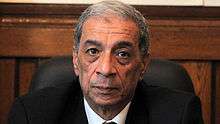Hisham Barakat
| Hisham Barakat | |
|---|---|
 | |
| Prosecutor General of Egypt | |
|
In office 10 July 2013 – 29 June 2015 | |
| President |
Adly Mansour (Acting) Abdel Fattah el-Sisi |
| Deputy | Zakaria Abdel-Aziz Osman |
| Preceded by | Abdel Meguid Mahmoud |
| Succeeded by | Zakaria Abdel-Aziz Osman (Acting) |
| Personal details | |
| Born |
Hisham Muhammad Zaki Barakat 21 November 1950 |
| Died |
29 June 2015 (aged 64) Heliopolis, Cairo, Egypt |
| Political party | Independent |
| Religion | Islam |
Hisham Muhammad Zaki Barakat (Arabic: هشام محمد زكي بركات Hišām Muḥammad Zakī Barakāt; 21 November 1950 – 29 June 2015) was Prosecutor General of Egypt from 2013 to 2015. During his term as state prosecutor, he was responsible for thousands of controversial prosecutions, including several widely deemed as politically motivated resulting in death sentences for hundreds of Muslim Brotherhood members and supporters of deposed Egyptian President Mohamed Morsi.[1] He was assassinated in a car bombing on 29 June 2015.
Early life
Barakat graduated from Cairo University with a B.A. in Law in 1973. Appointed to the Public Prosecution, he joined the judiciary and worked in courts of first instance and appeal courts.[2] He became the head of the technical office of the president of the Cairo Appeals Court.[3]
Prosecutor General
Barakat was appointed as Prosecutor-General by Egypt's interim President Adly Mansour after Abdel Meguid Mahmoud announced his resignation from the post in the aftermath of the 2013 Egyptian coup d'état. Barakat was sworn in on 10 July 2013.[3]
On 14 July 2013, Barakat ordered the freezing of assets of 14 prominent Egyptian Islamists: Muslim Brotherhood supreme guide Mohammed Badie, and his deputies Khairat el-Shater, Mohamed Ezzat and Rashad Baioumy; Mahdi Akef, the Brotherhood's former supreme guide; Mohamed Saad al-Katatny, head of the Freedom and Justice Party, FJP deputy leader Essam al-Erian and general secretary Mohamed al-Beltagy; Salafi preacher Safwat Hegazy; Essam Sultan, vice president of the Wasat Party; Assem Abdel Maged, member of the Jamaa Islamiya Shura Council; Hazem Salah Abu Ismail, Flag Party president; Tarek al-Zomor, Building and Development Party secretary; and former MP Mohammed al-Omda.[4]
On 18 December 2013, Barakat ordered the referral of deposed Egyptian President Mohamed Morsi to criminal court for charges of espionage in a statement under the title "The Biggest Case of Espionage in the History of Egypt". According to Barakat's investigations, the international organisation of the Muslim Brotherhood, allegedly aided by Hezbollah and Hamas, is accused of being the reason behind violence within Egypt; members are accused of intending to create a state of ultimate chaos after allegedly receiving media and military training in Gaza with the aim to implement jihadists in Sinai.[5]
Assassination
Barakat was assassinated in a car bombing on 29 June 2015 as he left his home in Heliopolis.[6][7] According to security sources, the bomb was planted in a parked car and remotely detonated at 10:00 a.m., hitting Barakat's motorcade. After the bombing, Barakat was admitted to al-Nozha hospital where he was pronounced dead at 12:30 p.m. after surgery and the cause of death was stated as "ruptures in the lung and stomach, and internal bleeding".[8] Five guards, two drivers and one civilian were injured during the attack.[9]
The death of Barakat was widely grieved and condemned across Egypt. Hours after news of the assassination broke, all private satellite channels in Egypt suspended their programmes and mourned Barakat's death.[10] On 30 June, Al Jazeera reported that Egyptian President Abdel Fattah el-Sisi announced that Rabaa Square would be renamed after Barakat. The square is the site of the August 2013 Rabaa massacre where more than 800 protesters were killed who were seeking the reinstatement of President Mohamed Morsi after he was deposed in a coup orchestrated by Sisi.[11] This was later denied by sources at the presidency indicating that the naming of streets and squares is not within the purview of the president.[12]
On 2 July, Egypt's public prosecution issued a gag order restraining media outlets from reporting updates on the investigation of the case. The gag order will remain in effect until the conclusion of the investigation, while statements on the case and its updates will be issued by the acting prosecutor-general's office.[13]
In the aftermath of the assassination, Egyptian Foreign Minister Sameh Shoukry instructed all Egyptian Diplomatic Missions to open books of condolence.[14]
References
- ↑ "Egypt's chief prosecutor Hisham Barakat killed by Cairo bomb". The Guardian. Retrieved 3 July 2015.
- ↑ "Factbox: Prosecutor General Hesham Barakat - Egypt Independent". egyptindependent.com.
- 1 2 Hisham Barakat appointed Egypt's top prosecutor, Ahram Online, 10 July 2013.
- ↑ Asset freeze for Islamist leaders goes into action, Egypt Independent, 15 July 2013.
- ↑ "Prosecutor general orders Morsi tried for espionage along with Brotherhood leaders". Daily News Egypt. 18 December 2013.
- ↑ "مصدر طبي بمستشفى النزهة: وفاة النائب العام متأثرًا بإصابته". Ahram News. Retrieved 29 June 2015.
- ↑ "Egyptian prosecutor killed in bomb attack". CBS News. Retrieved 29 June 2015.
- ↑ "Egypt's state prosecutor killed in Cairo bomb attack". Al Jazeera. Retrieved 2 July 2015.
- ↑ "Bomb kills Egypt's Top Prosecutor Hisham Barakat as he drives to work". IBNLive. Retrieved 3 July 2015.
- ↑ Youssef, Adham. "Prosecutor General's assassination sparks local uproar". Daily News Egypt. Retrieved 2 July 2015.
- ↑ "Egypt's Sisi to rename Rabaa Square after slain Barakat". Al Jazeera. Retrieved 2 July 2015.
- ↑ "مصادر: لا يوجد قرار جمهورى بتغيير اسم ميدان رابعة العدوية". youm7.
- ↑ "Egypt imposes gag order on investigation into prosecutor's assassination". Albawaba. Retrieved 3 July 2015.
- ↑ "Egypt: FM Orders Receiving Mourners At Egypt's Embassies Abroad". All Africa. Retrieved 30 June 2015.